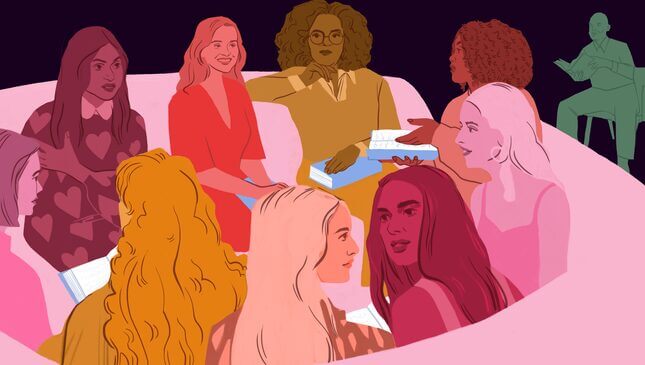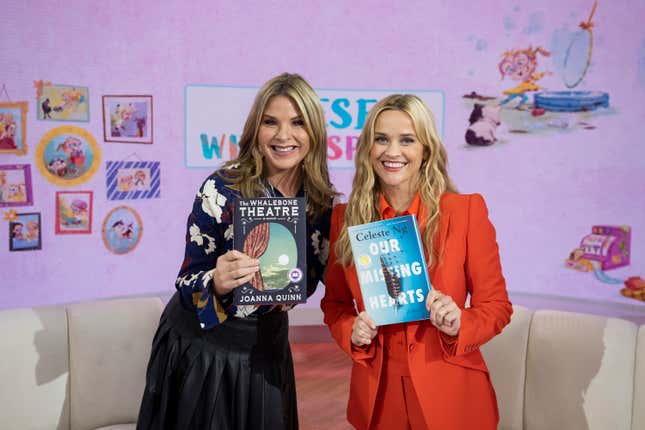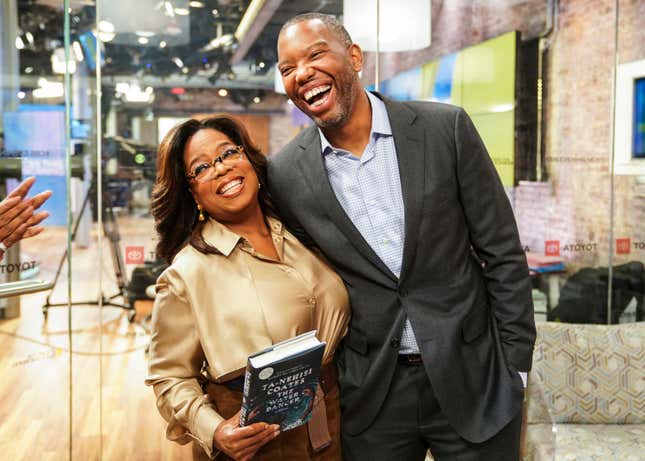Do Famous Men Know How to Read?
Skim through a list of celebrity book clubs, and you'll see the literati within Hollywood is a matriarchy. Celebrity men are missing out.
In Depth
Illustration: Stella Williams
Posing with book in hand and a gracious grin, Reese Witherspoon announced on Instagram last week that her April book club pick would be Romantic Comedy. Oprah’s Book Club chose Hello Beautiful. Model Kaia Gerber selected In Memoriam, while rapper Noname went with Elite Capture by Olúfẹ́mi O. Táíwò. Musician Florence Welch of Florence and the Machine is prompting her book club members to join her for Patricia Lockwood’s memoir Priestdaddy, and Jenna Bush Hager landed on Camp Zero. Read in between the lines, and you might glean who’s missing: Do famous men know how to read?
To put it plainly, celebrity book clubs are girls clubs. While men are certainly allowed within their ranks, the literati within Hollywood is a matriarchy. Exceptions include former Indianapolis Colts quarterback Andrew Luck, who has not updated his club’s Instagram since August 2020, and Flea of the Red Hot Chili Peppers, who on random occasion hops on Instagram Live to breathlessly discuss what he’s reading. LeVar Burton, whose life work is promoting literacy, hosts a virtual book club on the app Fable. As far as famous men consistently and currently recommending books in reading-group format, that is it. One guy.
Considering the current landscape for fame-backed business endeavors, I’m actually quite surprised more famous men aren’t tapping into the market. Even if they’re free to join, celebrity-helmed book clubs have the capacity to be cash cows. And more than raking in that sweet, sweet money, leading a book club is a smart way to cultivate a fan base. Unfortunately, their lack of hustle only strengthens my suspicions that leading men aren’t reading men.
“I love books,” Oprah Winfrey told her show’s live audience in 1996. “When I didn’t have friends, I had books. And one of the greatest pleasures I have right now in life is to be reading a really good book and to know I have a really, really good book after that book to read.” She then announced her inaugural book club pick, The Deep End of the Ocean by Jacquelyn Mitchard. Along with launching the first-ever celebrity book club, Oprah set the bar for the amount of reading enthusiasm future celebrity hosts would need to bring to their book clubs: a lot.
Sometimes that enthusiasm can border on hysteria. “I devoured In Memoriam through tears and tenderness,” Gerber wrote, encouraging her followers to pick up a copy of Alice Winn’s novel. “If you know me, you know I love a mystery, it’s kind of my illness,” Mindy Kaling claimed when announcing the latest release from her imprint Book Studio. These famous women keenly deploy the sensational language their readerships are fluent in. They understand the appeal of dramatic jargon—they are avid readers, after all! Witherspoon’s oeuvre is filled with bookish, type-A characters who themselves would gush about starting a book club—Tracy Flick, Elle Woods, Madeline Martha Mackenzie—as if her self-proclaimed love of books was self-fulfilling.

I wonder if celebrity men’s hesitancy to embrace what they see as feminine frivolity keeps them from leading book clubs. Are they way too cool for school to grovel at the emotional undoings of fictional characters? To admit they stayed up well into the night engrossed by the inner-workings of another person’s mind?
There’s a vulnerability to reading, to being curious about another world, that is intensified when you open up your interpretation of that world to discussion. I suppose that inquisitiveness could be read as antithetical to the tropes Hollywood places men into: doofy bro, dashing gentleman, the bumbling dad. Even the pompous, archetypal male literary figure bears the weight of literature by himself. He lectures, he doesn’t discuss. He has a command of words, not a susceptibility to them.
It’s hard to imagine a male celebrity acknowledging his vulnerability and using it as an opportunity to, say, start a book club like Noname did. After drawing backlash for tweeting that “capitalism was not evil,” Noname told PBS that she sought to educate herself on the complexities of a system that “keeps people poor and keeps people isolated and marginalized.” After reading authors like Frantz Fanon and George L. Jackson, she “selfishly thought there might be people who in the meeting could help me understand the material that I was struggling to get by myself.”
-

-

-

-

-

-

-

-

-

-

-

-

-

-

-

-

-

-

-

-

-

-

-

-

-

-

-

-

-

-

-

-

-

-

-

-

-

-

-

-









































